Unit 6 Bird watching Period 3课件(共26张PPT,含内嵌视频)牛津译林版八年级上册
文档属性
| 名称 | Unit 6 Bird watching Period 3课件(共26张PPT,含内嵌视频)牛津译林版八年级上册 | 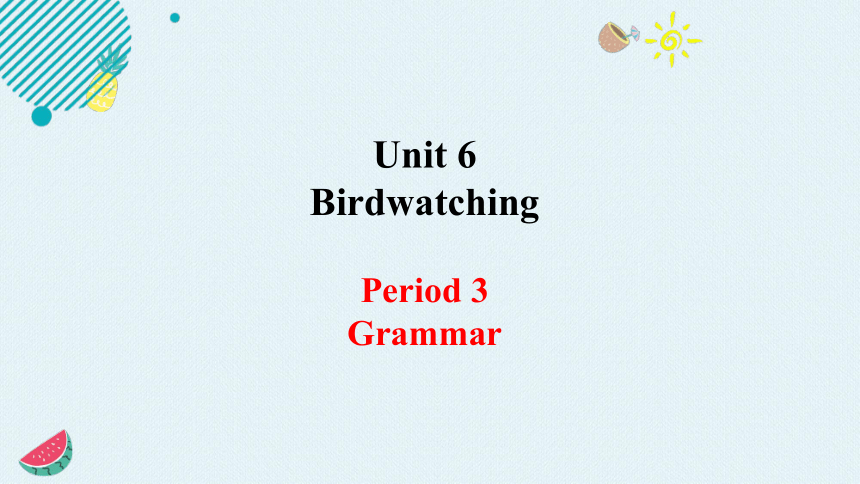 | |
| 格式 | pptx | ||
| 文件大小 | 8.9MB | ||
| 资源类型 | 教案 | ||
| 版本资源 | 牛津译林版 | ||
| 科目 | 英语 | ||
| 更新时间 | 2024-08-06 00:15:17 | ||
图片预览

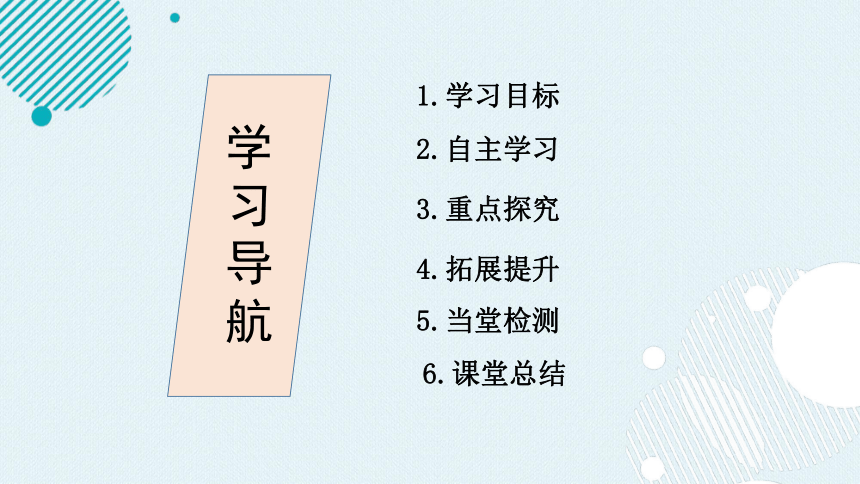
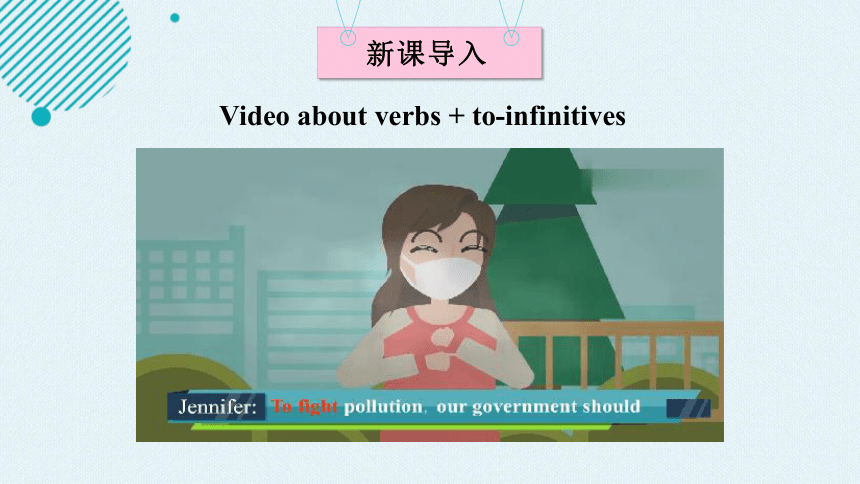
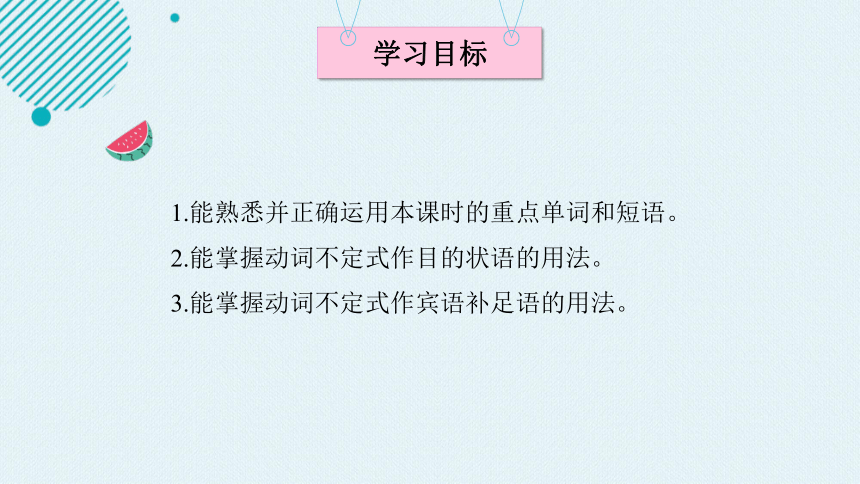
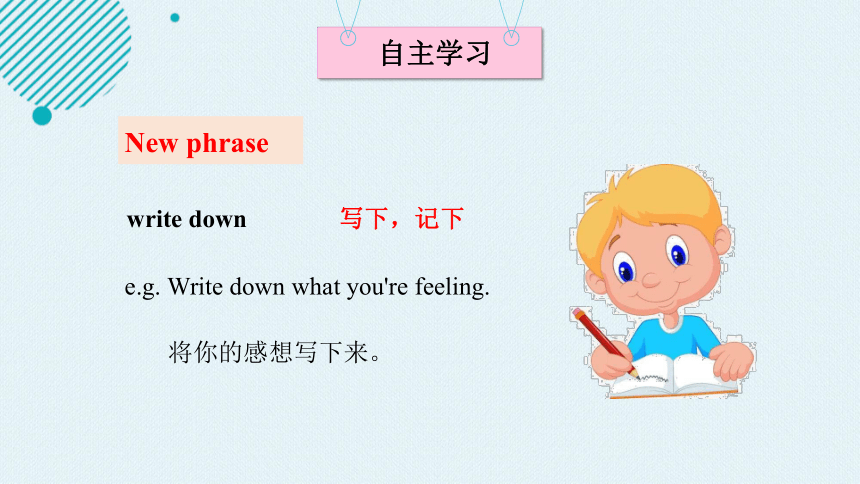
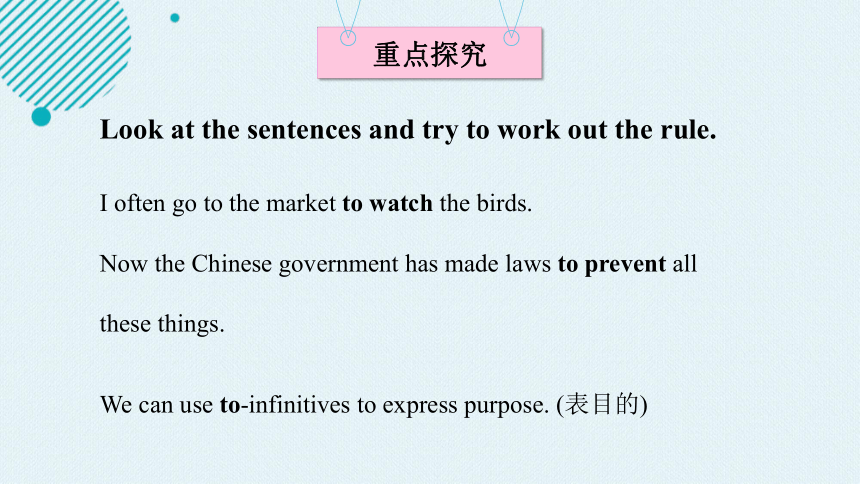
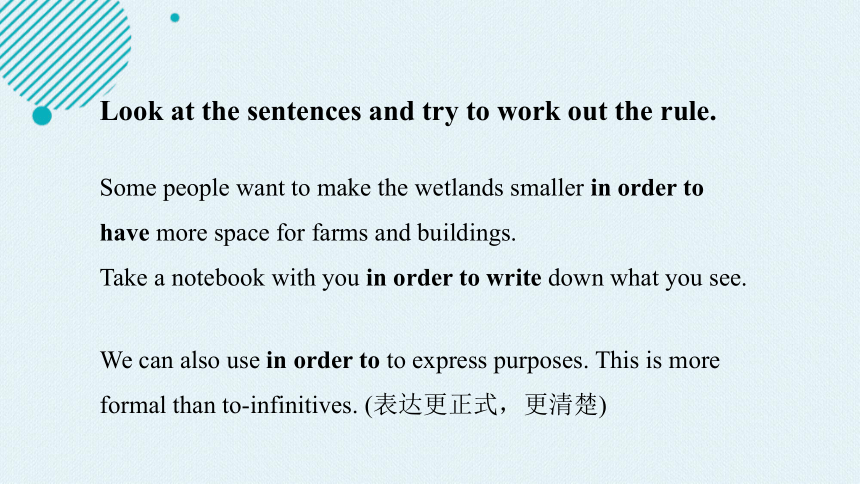
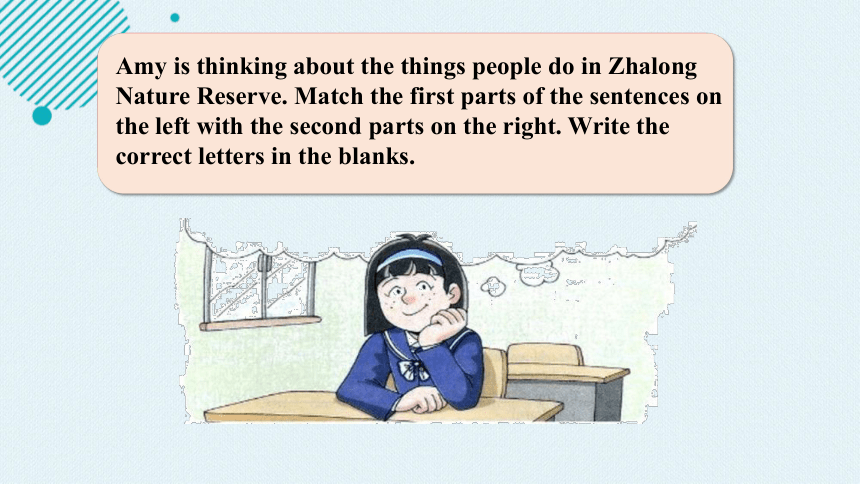
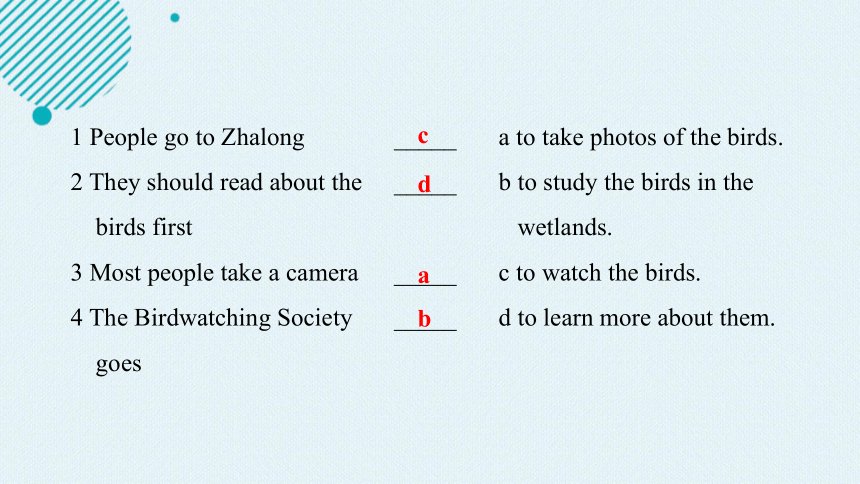
文档简介
(共26张PPT)
Unit 6
Birdwatching
Period 3
Grammar
1.学习目标
3.重点探究
2.自主学习
学习导航
5.当堂检测
6.课堂总结
4.拓展提升
新课导入
Video about verbs + to-infinitives
1.能熟悉并正确运用本课时的重点单词和短语。
2.能掌握动词不定式作目的状语的用法。
3.能掌握动词不定式作宾语补足语的用法。
学习目标
自主学习
New phrase
write down
写下,记下
e.g. Write down what you're feeling.
将你的感想写下来。
重点探究
I often go to the market to watch the birds.
Now the Chinese government has made laws to prevent all these things.
We can use to-infinitives to express purpose. (表目的)
Look at the sentences and try to work out the rule.
Some people want to make the wetlands smaller in order to have more space for farms and buildings.
Take a notebook with you in order to write down what you see.
We can also use in order to to express purposes. This is more formal than to-infinitives. (表达更正式,更清楚)
Look at the sentences and try to work out the rule.
Amy is thinking about the things people do in Zhalong Nature Reserve. Match the first parts of the sentences on the left with the second parts on the right. Write the correct letters in the blanks.
1 People go to Zhalong
2 They should read about the
birds first
3 Most people take a camera
4 The Birdwatching Society
goes
_____
_____
_____
_____
a to take photos of the birds.
b to study the birds in the
wetlands.
c to watch the birds.
d to learn more about them.
c
d
a
b
We are now inviting them to help us.
We need more people to count and describe the birds.
We can use some verbs with objects and to-infinitives.
(动词不定式在句中作宾语补足语)
Look at the sentences and try to work out the rules.
We ask people not to catch birds for any reason.
We add not before to-infinitives to express a negative meaning.
Tip:
We often use these verbs in this structures.
advise ask
invite order
teach tell
Max tells funny jokes and often makes me laugh.
Mr Wu agreed to let me join their school trip.
She saw a baby panda drink her mother's milk.
Millie and Amy heard someone sing in the park.
We can use some verbs in this structure with infinitives without to.
(使役动词、感官动词)
Look at the sentences and try to work out the rule.
This will help people understand the importance of the wetlands.
This will help people to understand the importance of the wetlands.
We can use help in this structure with infinitives with or without to.
Look at the sentences and try to work out the rule.
The Class 1, Grade 8 students went to Zhalong Nature Reserve. Sandy is writing about their trip. Help her complete the sentences with the correct forms of the words in brackets.
Mr Wu ________ us __________ a pair of comfortable shoes because we would have to walk a long way. (ask/wear)
We _________ some birds ______ in the trees. (hear/sing)
Mr Wu ______ us ________ the birds carefully. ( tell/watch)
asked to wear
heard sing
told to watch
He also __________ us ______________ the birds. (encourage/describe)
He __________ us _____________ in the wetlands. ( advise/not shout)
The cold weather _____ some birds ______ south for the winter. (make/fly)
The trip ________ us _________ more about wildlife. (help/learn)
encouraged to describe
advised not to shout
made fly
helped (to) learn
拓展提升
Language Points
1. Take a notebook with you in order to write down
what you see.
write down 写下,记下
e.g. Write down what you would like to tell me here.
在这写下你想对我说的。
动词不定式作目的状语
我们还可以用动词不定式表示某一动作或状态的目的。如:
He stopped to ask the way. 他停下来问路。
He stayed at the school to clean the classroom.
他留在学校打扫教室。
为了使表达更加清楚或对目的加以强调,还可以在动词前面用in order to。如:
She is running quickly in order to catch the first bus.
为了赶上首班公交,她正飞快地跑着。
I will sit in the front in order to hear more clearly.
为了听得更清楚,我要坐在前面。
注意:由in order to引导的目的状语,既可以置于句尾,也可以置于句首。如:
They started early in order to get there in time.
=In order to get there in time, They started early.
为了及时赶到那里,他们很早就出发了。
动词不定式作宾语补足语
我们可以用动词不定式来说明宾语的情况,此时动词不定式在句中作宾语补足语。如:
I want you to sing a song for us. 我想让你给我们唱首歌。
My father asked me to post a letter. 我爸爸让我寄封信。
动词不定式作宾语补足语,有带to和不带to两种形式。如:
The teacher asked us to read English every day. 老师叫我们每天读英语。
My mother made me clean my bedroom. 我母亲让我打扫卧室。
常跟带to的动词不定式作宾语补足语的动词有:ask、tell、order、invite、get、allow、wish、want、encourage、advise、warn、like、love、hate等。如:
The policeman told the boys not to swim in the river.
警察告诉男孩们别在这条河里游泳。
What do you want me to buy for you
你想让我为你买什么?
常跟不带to的动词不定式作宾语补足语的动词有:感官动词。如:感官动词:hear、feel、see、watch、notice等;使役动词let、make、和have。如:
I saw her open the door.
我看见她开门。
You can let the boy go first.
你可以让那个男孩先走。
notice
listen to
hear
watch
五看
see
look at
observe
三使
let
make
have
二听
一感觉:
feel
+ sb. do sth.
(不带to)
动词help后面的动词不定式可带to,也可不带to。如:
She often helps me (to) do the housework.
她常常帮我做家务。
We help him (to) fix his bike.
我们帮他修自行车。
当堂检测
一、用所给单词的适当形式完成下列句子。
1. She advises us _____ (do) more exercise.
2. The man asks them _________ (not play) on the road.
3. Our parents encourage us ______ (study) harder.
4. We often hear the boy________ (sing).
5. She saw a girl _______ (come) into the house.
to do
not to play
to study
sing
come
二、同义转换。
1. He stayed at the school to clean the classroom.
=He stayed at the school ___ _____ ___ _____ the classroom.
=____ _____ ____ _____ the classroom, he stayed at the school.
in order to clean
In order to clean
2. We should make laws to protect animals.
=We should make laws ___ _____ ___ _____ animals.
=___ _____ ___ _____ animals, We should make laws.
in order to protect
In order to protect
课堂总结
重点单词和短语:
birdwatching, understand, describe, write down
动词不定式作目的状语:
我们可以用动词不定式表示某一动作或状态的目的。
动词不定式作宾语补足语:
我们用动词不定式来说明宾语的情况,此时动词不定式在句中做宾语补足语。
Unit 6
Period 3
Unit 6
Birdwatching
Period 3
Grammar
1.学习目标
3.重点探究
2.自主学习
学习导航
5.当堂检测
6.课堂总结
4.拓展提升
新课导入
Video about verbs + to-infinitives
1.能熟悉并正确运用本课时的重点单词和短语。
2.能掌握动词不定式作目的状语的用法。
3.能掌握动词不定式作宾语补足语的用法。
学习目标
自主学习
New phrase
write down
写下,记下
e.g. Write down what you're feeling.
将你的感想写下来。
重点探究
I often go to the market to watch the birds.
Now the Chinese government has made laws to prevent all these things.
We can use to-infinitives to express purpose. (表目的)
Look at the sentences and try to work out the rule.
Some people want to make the wetlands smaller in order to have more space for farms and buildings.
Take a notebook with you in order to write down what you see.
We can also use in order to to express purposes. This is more formal than to-infinitives. (表达更正式,更清楚)
Look at the sentences and try to work out the rule.
Amy is thinking about the things people do in Zhalong Nature Reserve. Match the first parts of the sentences on the left with the second parts on the right. Write the correct letters in the blanks.
1 People go to Zhalong
2 They should read about the
birds first
3 Most people take a camera
4 The Birdwatching Society
goes
_____
_____
_____
_____
a to take photos of the birds.
b to study the birds in the
wetlands.
c to watch the birds.
d to learn more about them.
c
d
a
b
We are now inviting them to help us.
We need more people to count and describe the birds.
We can use some verbs with objects and to-infinitives.
(动词不定式在句中作宾语补足语)
Look at the sentences and try to work out the rules.
We ask people not to catch birds for any reason.
We add not before to-infinitives to express a negative meaning.
Tip:
We often use these verbs in this structures.
advise ask
invite order
teach tell
Max tells funny jokes and often makes me laugh.
Mr Wu agreed to let me join their school trip.
She saw a baby panda drink her mother's milk.
Millie and Amy heard someone sing in the park.
We can use some verbs in this structure with infinitives without to.
(使役动词、感官动词)
Look at the sentences and try to work out the rule.
This will help people understand the importance of the wetlands.
This will help people to understand the importance of the wetlands.
We can use help in this structure with infinitives with or without to.
Look at the sentences and try to work out the rule.
The Class 1, Grade 8 students went to Zhalong Nature Reserve. Sandy is writing about their trip. Help her complete the sentences with the correct forms of the words in brackets.
Mr Wu ________ us __________ a pair of comfortable shoes because we would have to walk a long way. (ask/wear)
We _________ some birds ______ in the trees. (hear/sing)
Mr Wu ______ us ________ the birds carefully. ( tell/watch)
asked to wear
heard sing
told to watch
He also __________ us ______________ the birds. (encourage/describe)
He __________ us _____________ in the wetlands. ( advise/not shout)
The cold weather _____ some birds ______ south for the winter. (make/fly)
The trip ________ us _________ more about wildlife. (help/learn)
encouraged to describe
advised not to shout
made fly
helped (to) learn
拓展提升
Language Points
1. Take a notebook with you in order to write down
what you see.
write down 写下,记下
e.g. Write down what you would like to tell me here.
在这写下你想对我说的。
动词不定式作目的状语
我们还可以用动词不定式表示某一动作或状态的目的。如:
He stopped to ask the way. 他停下来问路。
He stayed at the school to clean the classroom.
他留在学校打扫教室。
为了使表达更加清楚或对目的加以强调,还可以在动词前面用in order to。如:
She is running quickly in order to catch the first bus.
为了赶上首班公交,她正飞快地跑着。
I will sit in the front in order to hear more clearly.
为了听得更清楚,我要坐在前面。
注意:由in order to引导的目的状语,既可以置于句尾,也可以置于句首。如:
They started early in order to get there in time.
=In order to get there in time, They started early.
为了及时赶到那里,他们很早就出发了。
动词不定式作宾语补足语
我们可以用动词不定式来说明宾语的情况,此时动词不定式在句中作宾语补足语。如:
I want you to sing a song for us. 我想让你给我们唱首歌。
My father asked me to post a letter. 我爸爸让我寄封信。
动词不定式作宾语补足语,有带to和不带to两种形式。如:
The teacher asked us to read English every day. 老师叫我们每天读英语。
My mother made me clean my bedroom. 我母亲让我打扫卧室。
常跟带to的动词不定式作宾语补足语的动词有:ask、tell、order、invite、get、allow、wish、want、encourage、advise、warn、like、love、hate等。如:
The policeman told the boys not to swim in the river.
警察告诉男孩们别在这条河里游泳。
What do you want me to buy for you
你想让我为你买什么?
常跟不带to的动词不定式作宾语补足语的动词有:感官动词。如:感官动词:hear、feel、see、watch、notice等;使役动词let、make、和have。如:
I saw her open the door.
我看见她开门。
You can let the boy go first.
你可以让那个男孩先走。
notice
listen to
hear
watch
五看
see
look at
observe
三使
let
make
have
二听
一感觉:
feel
+ sb. do sth.
(不带to)
动词help后面的动词不定式可带to,也可不带to。如:
She often helps me (to) do the housework.
她常常帮我做家务。
We help him (to) fix his bike.
我们帮他修自行车。
当堂检测
一、用所给单词的适当形式完成下列句子。
1. She advises us _____ (do) more exercise.
2. The man asks them _________ (not play) on the road.
3. Our parents encourage us ______ (study) harder.
4. We often hear the boy________ (sing).
5. She saw a girl _______ (come) into the house.
to do
not to play
to study
sing
come
二、同义转换。
1. He stayed at the school to clean the classroom.
=He stayed at the school ___ _____ ___ _____ the classroom.
=____ _____ ____ _____ the classroom, he stayed at the school.
in order to clean
In order to clean
2. We should make laws to protect animals.
=We should make laws ___ _____ ___ _____ animals.
=___ _____ ___ _____ animals, We should make laws.
in order to protect
In order to protect
课堂总结
重点单词和短语:
birdwatching, understand, describe, write down
动词不定式作目的状语:
我们可以用动词不定式表示某一动作或状态的目的。
动词不定式作宾语补足语:
我们用动词不定式来说明宾语的情况,此时动词不定式在句中做宾语补足语。
Unit 6
Period 3
